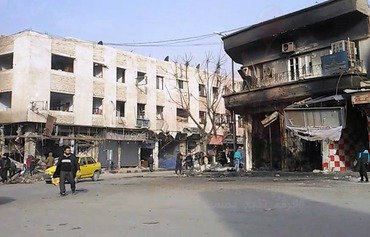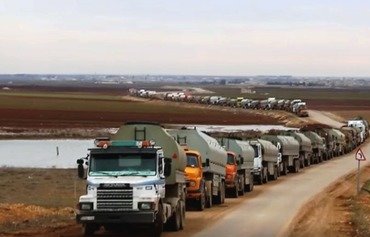Acute poverty and widespread unemployment prevail in areas of Iraq and Syria controlled by the "Islamic State of Iraq and the Levant" (ISIL), residents of those areas tell Diyaruna, revealing that the group is not capable of governance.
The reality on the ground is starkly different than the rosy picture painted by the ISIL media machine , they said, which consistently portrays the situation in the areas under its control as happy and prosperous.
"ISIL continues to lie through its media machine about the situation in the areas under its control in the hope of recruiting new fighters," former al-Raqa Media Office activist Majed Hassoun told Diyaruna.
The truth is that the group’s situation is dismal across the board, he said.
In addition to mounting defeats and setbacks, he said, the group is facing an acute shortfall in the number of its fighters and has lost numerous leaders.
Meanwhile, he added, civilians in areas that remain under ISIL control "are suffering because of the restrictions imposed upon them".
In the Syrian city of al-Raqa, he said, ISIL has been using civilians as human shields -- hiding behind them to protect its own fighters -- and has been digging tunnels to protect itself from coalition airstrikes.
ISIL "has deployed elements to the homes of civilians, many of which have been turned into military posts or housing for the families of the group’s elements and emirs", Hassoun said, adding that this has put civilians in danger.
In Iraq, cash-strapped ISIL extremists are punching holes in people's homes to move across west Mosul undetected and are now asking victims to pay a fee for the labour.
The string of holes in adjacent homes acts like a street-level tunnel that allows fighters to move without losing their cover from Iraqi and international coalition.
'A paper tiger'
Since ISIL's emergence, its media machine has constantly boasted of its tremendous power and portrayed itself as invincible, said terror group expert Maj. Gen. Yahya Mohammed Ali, a retired Egyptian military officer.
"The boasting included gloating about the number of elements it has in its ranks and their various specialisations, and the modern weapons and equipment it is able to acquire through the global black market," he said.
These claims began to crumble after ISIL lost the battle for Kobani, Ali said, which was "one of the first indications that the group is but a paper tiger".
"The course of events after that battle, in both Syria and Iraq, has clearly shown that the group’s only real strength is hiding behind civilians in the areas still under its control," he added.
"If it were not for the group’s usage of civilians as human shields and the deployment of its elements between houses, the battle would have ended months ago," Ali said.
Living testimony to ISIL's lies
"Residents of the city of al-Raqa and surrounding rural areas are a living testimony to the lies of ISIL’s propaganda," said al-Raqa schoolteacher Nasser Ali, who asked to use a pseudonym out of fear for his safety.
Over the past three years, they have experienced deteriorating conditions, he told Diyaruna, which include "extreme poverty, poor social conditions and deprivation of the most basic rights".
The group has put its fingers into the region's coffers and has depleted its resources under the guise of implementing "sharia", he said.
ISIL seized control of water, telecommunication and electricity networks, "which slipped into very poor condition by the testimony of the region’s residents", Ali added.
"Drinking water is unfit for human consumption, electricity is rarely available, cell phones work only with Turkish telecommunication networks, and only a few landlines are operational," he added.
Al-Raqa residents are careful about using landlines, he added, "because they are undoubtedly monitored".
"The group controls all agricultural lands in al-Raqa, as it considers them the property of its 'state', then leases them back to the farmers," Ali said.
ISIL also dominates the distribution of fertiliser and seeds, and sells them through affiliated intermediaries at very high prices, which has driven up the price of vegetables, fruit, grain and all kinds of produce, he said.
"The group also controls all goods that enter the area and imposes high taxes and transit fees, which has seen a hike in prices to excessive levels," he added.

![Syrian civilians from al-Raqa fleeing the 'Islamic State of Iraq and the Levant' receive aid from the Syrian Democratic Forces. [Photo courtesy of Syrian Democratic Forces]](/cnmi_am/images/2017/02/10/7226-Syria-raqa-civilians-600_384.jpg)






